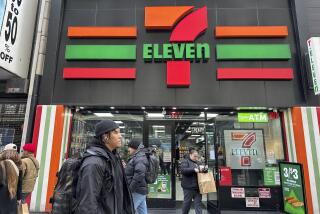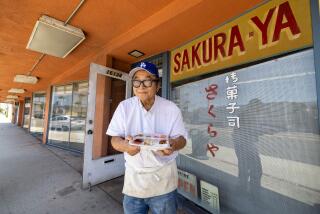Southland’s Suitor Well Known for Its Retailing Savvy : Buyout: Ito-Yokado, consistently the most profitable merchandising firm in Japan, is adept at revitalization.
The much admired Japanese retailer Masatoshi Ito delivered a gloomy message to his fast-growing chain’s managers back in 1981: prepare for rough weather.
For the rest of the decade, his Ito-Yokado Co. sheltered itself from stormy economic conditions by looking inward. Instead of continuing to expand aggressively, it focused on cutting costs and boosting sales at its existing combination food and general merchandise stores and other retail outlets.
But now, having emerged as consistently the most profitable retailer in Japan, Ito-Yokado apparently sees sunny skies ahead. In a bold stroke, it is trying to become the biggest Japanese player in U.S. retailing by buying 75% of Southland Corp., parent of the 7-Eleven convenience store chain.
Judging from what Ito-Yokado has accomplished in Japan, some analysts believe that the company’s acquisition proposal is the best hope for financially crippled Southland. Ito-Yokado has been partners with Southland for 17 years, and is the majority owner of 7-Eleven Japan, that nation’s largest convenience store chain with 3,940 stores.
“The company has the money, know-how and will to do it,” said Hirokazu Ishii, a retailing analyst with Nomura Research Institute in New York.
Still, Ishii was surprised by the tentative agreement announced Thursday for Ito-Yokado to acquire control of Southland. The cash-and-debt deal is valued by some analysts at as high as $1 billion. Until now, Ishii noted, Ito has taken a deliberate approach to building his company’s business.
Although regarded as a farsighted entrepreneur, Ito has succeeded more by deftly copying and adapting American merchandising techniques than by developing his own innovations. After visiting the United States for the first time in 1960, Ito began opening stores with American-style supermarkets on the ground floor and other retail departments upstairs.
The flagship chain now consists of more than 135 discount stores, mainly in the Tokyo area, which are the rough equivalent of a Lucky, May Co. and Circuit City all rolled into one. The company also has branched out with its 7-Eleven outlets and a chain of more than 300 coffee shops operated by its Denny’s Japan Co. unit.
All told, Ito-Yokado earned more than $400 million in its fiscal 1989 on sales of about $12 billion, making it the nation’s second-largest retailer. Overall, the organization employs more than 38,700 full- and part-time workers. Meanwhile, publicity-shy Ito, now in his 60s, has amassed a family fortune valued last summer at about $1.7 billion.
In the 1980s, Ito-Yokado took two major steps to revitalize. First, the company went through its shelves, item-by-item, to figure out what products and brands were selling well and which weren’t. In the average Ito-Yokado store, the entire inventory turned over in 33 days in 1980, Ishii said. But by 1984, the average inventory turnover was reduced to 20 days.
Then, in the mid-1980s, the company concentrated on developing its so-called point-of-sale system, the electronic cash register equipment that allows each of its stores to keep close track of sales and inventories. These high-tech systems gave the company a special advantage in Japan, which still suffers from arcane distribution systems and is dominated by mom-and-pop stores that charge consumers high prices.
Ito-Yokado officials could not be reached for comment on their plans for Southland, the world’s largest convenience store chain. The motivation for the acquisition may be partly a defensive move, stemming from concerns that Japanese visitors to the United States who see rundown 7-Eleven stores in this country might develop second thoughts about shopping at the sister stores back in Japan.
Analysts added that the type of merchandising and technology improvements Ito-Yokado has made in its stores in Japan might be the right tonic for U.S. 7-Eleven outlets. Along with being dragged down by debt from its $4.9-billion management buyout in 1987, Southland has been hurt by problems that have plagued the entire convenience store industry.
Among other things, the stores have been hurt by stepped-up competition from supermarkets, drugstores and oil firms that opened their own mini-markets. In addition, convenience stores that have been heavily dependent on sales of such goods as beer and cigarettes have been hurt by changing consumer tastes.
“You can no longer run a company like this by just selling beer to men,” said Kurt Barnard, publisher of Retail Marketing Report. “You need to attract today’s woman, and these women would now cross the street before going into a convenience store.”
The Ito-Yokado deal, however, is far from certain to be completed. It requires the approval of the vast majority of holders of Southland’s $1.8 billion in junk bonds, and many bond fund managers say terms will have to be improved before investors will give their consent.
Analysts discounted concerns, however, that rising U.S.-Japan trade tensions could disrupt the negotiations. Among other reasons, Southland has had long ties with Ito-Yokado and is in dire need of a bailout by a financially strong partner.
“If anyone in the world is in a position to help them, it’s Ito-Yokado,” said Sam Nakagama, chairman of the economic advisory firm Nakagama & Wallace in New York.
More to Read
Inside the business of entertainment
The Wide Shot brings you news, analysis and insights on everything from streaming wars to production — and what it all means for the future.
You may occasionally receive promotional content from the Los Angeles Times.










